Press releases
The Prime Minister gets acquainted with the innovative programs of the ASUE Gumri branch and delivers a lecture on the topic of "Economic Development as a State Interest"
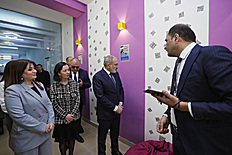 1670x1113px - 453 Kb
1670x1113px - 453 Kb 1670x1113px - 487 Kb
1670x1113px - 487 Kb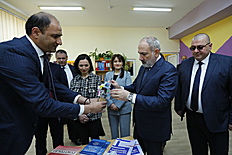 1670x1113px - 446 Kb
1670x1113px - 446 Kb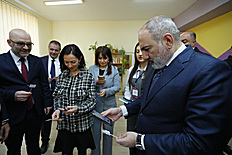 1670x1113px - 435 Kb
1670x1113px - 435 Kb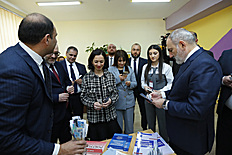 1670x1113px - 483 Kb
1670x1113px - 483 Kb 1670x1113px - 355 Kb
1670x1113px - 355 Kb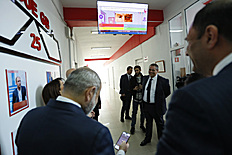 1670x1113px - 373 Kb
1670x1113px - 373 Kb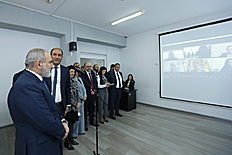 1670x1113px - 273 Kb
1670x1113px - 273 Kb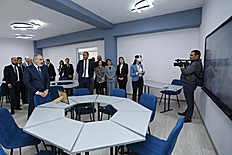 1670x1113px - 439 Kb
1670x1113px - 439 Kb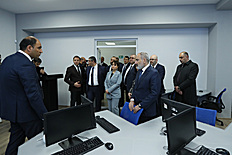 1670x1113px - 375 Kb
1670x1113px - 375 Kb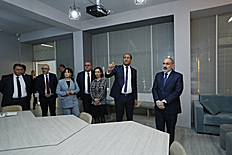 1670x1113px - 457 Kb
1670x1113px - 457 Kb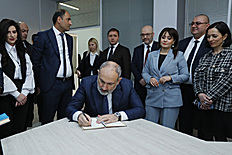 1670x1113px - 489 Kb
1670x1113px - 489 Kb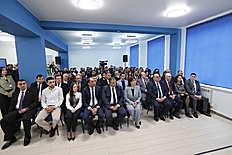 1670x1113px - 509 Kb
1670x1113px - 509 Kb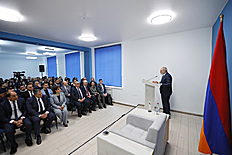 1670x1113px - 417 Kb
1670x1113px - 417 Kb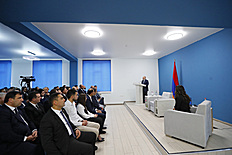 1670x1113px - 397 Kb
1670x1113px - 397 Kb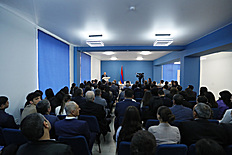 1670x1113px - 364 Kb
1670x1113px - 364 Kb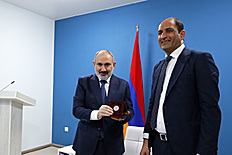 1670x1113px - 375 Kb
1670x1113px - 375 Kb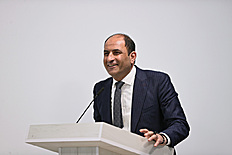 1670x1113px - 271 Kb
1670x1113px - 271 Kb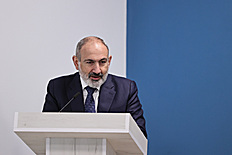 1670x1113px - 318 Kb
1670x1113px - 318 Kb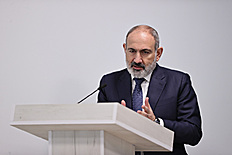 1670x1113px - 264 Kb
1670x1113px - 264 Kb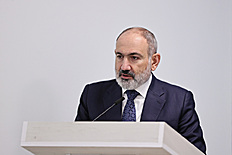 1670x1113px - 299 Kb
1670x1113px - 299 Kb
more 18 photos
Prime Minister Nikol Pashinyan visited the Gyumri branch of the Armenian State University of Economics. The Prime Minister first toured the university, got acquainted with the educational process and innovative programs, and then a new initiative was launched, within the framework of which the platform for panel discussions was opened. The first guest and speaker of the latter was Prime Minister Nikol Pashinyan on the topic "Economic development as a state interest".
During the visit, the Digital info system was launched, which is an information network aimed at making information more accessible to students and professors on the campus. It will provide the student and teaching community with quick access to individual modules featuring academic resources, announcements, current and planned events, promoting access to information about campus life. In the Digital info system, information will be presented in three classifications according to colors. red is urgent, green is informative, and yellow is the information presented about planned events.
The "Public Speach Auditorium" was also opened. This platform is intended for organizing public speeches. It will contribute to the development of communication skills and critical thinking of the student community.
In order to organize the extracurricular activities of students and professors, the university has created technically equipped consultation rooms for formal and informal meetings, where they will have the opportunity to have group or individual meetings-discussions.
The university has also established the "AI/VR Business Support Center" and the "DTL Digital Transformation Lab". The first will serve to create a platform for the business sector to use the opportunities provided by artificial intelligence in their field of activity. And the second will serve to organize the learning process more effectively, introducing modern technologies and artificial intelligence capabilities (for example, using AI assistant).
Next, Prime Minister Pashinyan delivered a lecture on "Economic development as a state interest" and answered the questions of the audience.
In his speech, the Prime Minister first thanked for this opportunity and noted that the initiative is a success. "Today I will deliver a lecture and the topic I have proposed is: "Economic development as a state interest", and I want to say that I do not have much experience in giving a lecture. I hope that this esteemed audience and university will be forgiving of my shortcomings in this role, and of course, if I succeed today, this conversation will become more systematic.
I don't want to give the impression that only the university, professors or students need such conversations, we need this as much, or maybe more, because what we think about in the offices, which sometimes possess an opportunity or have the habit to get away from reality, it is very important for us to share what we think outside of offices and work halls, try to test them, then listen to criticism and, finally, confirm, be more sure that we are thinking in the right direction or vice versa, record that the process of thinking is still necessary to change.
Returning to the topic of the lecture, "Economic development as a state interest", I want to say right away. I think that by and large, the word economic here is, in a sense, a repetition, because if we consider any development formula, that development is related to the economy. Development in any field has a certain economic component, especially the development of the country, and by saying the development of the country, we mean first of all economic development, because of course there are developments in other areas that stimulate economic development, but in the end, all these processes are stimulated primarily from the point of view of economic development. Of course, there could be the story of chicken and egg here, but today I want to talk about economic development," said the Prime Minister.
According to Nikol Pashinyan, we should distinguish between two concepts: economic growth and economic development, because economic growth in many cases does not lead to economic development. "We face these situations yesterday and today, and in Armenia, for example, a high indicator of economic activity is recorded or economic growth is recorded, an increase in the gross domestic product is recorded, and when we try to observe in more detail, in these observations, sometimes we conclude that they do not satisfy the logic of economic development. For example, I want to bring you the situation of the summer of 2018 as an example, when we saw that there was a high level of economic activity in the country for months, and when we tried to understand what was the reason for this, we realized that the reason was the football world championship, because the bets were very active and they became so active that it had an effect on the index of economic activity. Of course, I don't want to say that the companies engaged in this field have nothing to do with economic development, but nevertheless, there are such nuances. In recent years, when dealing with indicators of economic activity in Armenia, we see that sometimes re-export processes play a very significant role, which do not bring economic development to the Republic of Armenia. What do we mean by economic development or when are we satisfied with the indicator of economic development? When we see that they create jobs, as economists say, creates added value, generate taxes and promote education, technology, promote economic efficiency.
I want to address the next question, why exactly "Economic development as a state interest", why do I want to discuss the issue from this point of view? The issue is that here we have two components: state and development. I have already presented the logic of economic development, now I want to address the state.
The problem is that having a state is actually a very expensive pleasure. The state is the most expensive of the projects, potential projects carried out by the collective of people. The state is the collective project and initiative of citizens, or at least it should be. And, of course, a person is a part of a social system, a member of a social system, and different groups of people can have all kinds of initiatives, but there is no initiative that is more expensive than the state in terms of price, and also in terms of value. And therefore, to have a state means to be able to generate the necessary resources to support the existence of that state. It means ensuring economic growth and economic development. And here, even more so, in today's environment and conditions, I must record that this problem is getting worse, because in the modern world, and it used to be like that in general, but now it is more visible, the competition has intensified.
The competition is the state itself. Basically, it has always been like that in the modern world, but I want to talk about today, because today is especially so, states compete with each other and among themselves, and withstanding that competition requires certain resources, large resources, increasingly large resources. What are the states competing for? This is an important question that I considered essential to address. There are several options, that is, there are several directions of competition, some of them I want to highlight and emphasize.
First, states compete for people. This is a very important point because, after all, the most important goal of any state is to be more attractive to people. You see, we often do not institutionalize topics that are relevant to our reality.
One of the most debated topics throughout our country's history is the extensive migration. If we try to formulate this phenomenon institutionally, this means that we, the Republic of Armenia, have lost the competition for a person, because the person who decided to live not in the Republic of Armenia, but in some other country, means that the Republic of Armenia has lost in the competition for a person. And in the modern world, this competition has two sides, even three sides, because states compete, yes, and this competition has different intensity for different countries. Of course, it should be noted that there are countries that have a problem of over-population. But the essence of the question does not change from this, now we will see how.
States compete for person, both their own population and the population of other countries in all sorts of directions. Today, states compete for the most talented people to come, work and drive economic development, and they struggle at all levels. For example, competition in tourism is also a struggle for a person to spend their vacation there. And therefore the greatest task of any country is to become attractive to person.
What else are the countries struggling for? They struggle for markets, and here we are talking about both export markets and import markets. And, of course, without certain economic powers and opportunities, it is impossible to win the battle for markets. And we are facing that problem today, and the states are struggling for the technologies. We saw today that the university branch is the most excited when technology is introduced to organize education and activities, and it is natural.
States struggle for influence, and the economy and economic opportunities are of paramount importance in the modern world. In many cases, as a state, as a government, we can feel our foreign political vulnerabilities at least for the reason that we are not able to sufficiently push forward the economic component in the foreign political agenda according to the logic I said before. We have very little to offer in terms of economy, and this is one of the biggest obstacles to our economic development, but also our esteemed partner in artificial intelligence was the first to emphasize that we must be attractive to economic activity. But what we think we lack today does not mean that there is no possibility of having and creating it. This is where the issue is, that it is necessary to focus more on economic development as a state interest.
Let it not seem strange, I have slightly exacerbated the topic - countries are fighting for food, and food security is one of the primary topics in the modern world today. It should be noted that the supply of goods in general is an integral part of the political, management and strategic agendas of especially developed countries today. This is a phenomenon that is not given much attention, at least in our reality, because we have obviously lived very difficult periods, we have gone through a very difficult time, and those who follow the news for a long time see what is happening in developed countries. If, for example, tomatoes are missing from stores for a month or a week, there is a shortage of lettuce. I remember years ago, when there was a shortage of lettuce in the supermarkets of the capital city of one of the European countries, at that time all the international news started with the discussion about that situation, because this is where my next point comes from - what the states are struggling for. Struggle for comfort, because especially in developed countries, which, by the way, are the main locomotive of global economic growth, because it is the demand created among them that also stimulates the economic growth of other countries, and life there with lettuce, tomatoes, strawberries, high technology, is essentially an organized system, it may seem strange when you suddenly take tomatoes, strawberries and lettuce out of that system and it may happen that the system does not work completely and fully. I brought these examples to show why economic development is important as a state interest.
In the next stage, I want to address what the state interest is. And what is state interest in general? State interest is obviously the guideline around which all actions, all policies, all discourses and all strategies are formed. What does this mean? It means that if we formulate economic development as a state interest, the government should adjust all its policies, that is, it should consider economic development itself as a guideline. When adopting any policy, any strategy, we should put the following question in the first, second and third place: to what extent this strategy, policy, law contributes to the economic development of Armenia? I also want to talk about the practical side of this narrative and approach, because state interest-economic development is the indicator by which we ultimately show how much our or any country's competitiveness is growing, because I said a little while ago that the competition of countries is growing and those who want to have a continuously successful state, their task is very specific - to ensure the competitiveness of that state. The way and means of ensuring the competitiveness of that state is economic development, and economic development is the most important indicator of how much we, as a collective community, work, invest to increase the competitiveness of the state.
By the way, economic development is also a unifying factor, and the peculiarity is that absolutely everyone has the opportunity to contribute to it. And everyone's work becomes key and strategic. The small entrepreneur who creates and develops a small business should view his business and himself from a strategic perspective, because it also fosters motivation.
I want to touch again on a phenomenon or a concept, which in our case is very important, understandable, very popular, and it is in everyone's mind and is used a lot. That concept is patriotism. As I said, we still need to subject the word emigration to institutional transformation. Migration means that our country is losing the competition for people, and so is patriotism, if we put it in this logic, patriotism is necessary to the extent it contributes to economic development. And now I also want to speak about how economic development solves the agenda, the problems that I spoke about a little while ago, any agenda.
The situation is that only economic development can ensure the well-being of citizens. In other words, from the position of a loser to the position of a person who at least endures competition, because well-being is first of all the factor that keeps a person in the country and attracts him to the country. And what should we understand by saying well-being? Of course, the lettuce, tomatoes and strawberries I mentioned a little while ago are also part of well-being, but it is not completeness, and especially in our case, we must consider security as the most important component of ensuring well-being. And the deeper the economic development, the higher the level of security. Moreover, there is a simple explanation and a complicated explanation here, and I want to start with the simple explanation first, because as I said, any state has a price, security also has a price. And if we have security vulnerabilities, if we formulate it again institutionally, it means that today we were unable or unwilling to pay the price that should ensure our security.
You know the modern world in our reality. Moreover, the word "market" at least contains certain negative perception in it, and this, in my opinion, speaks of the need to adjust institutional thinking, because the modern world in general, in my opinion, is a market where everything is sold, including security. The "market" has its needs. That is, when we enter the market, for example, the stock market, there are all kinds of things for sale. You must have the necessary means to purchase that item. Moreover, it is also very important to understand that this market is not only about buying, but also about selling.
And in terms of institutional and state interests, our perception of the world is very important. Our perception of the world is also related to our perception of economic development as a state interest, because if we consider the reality from the point of view of perceiving security as a commodity, we will see that we have wounds there, in the famous formulation given by His Highness Khrimyan Hayrik, which is about "a paper and iron ladle". Moreover, I think he is thinking about that line of reasoning, because he is talking about two products: the "paper ladle", which is obviously cheaper and that is why we have it, and the slightly more expensive product, the iron ladle, which is obviously more expensive and that's why we don't have it. But the reason is also that we do not have the appropriate economic potential to ensure it.
In this sense, from the point of view of ensuring security, we are primarily talking about the army. And in my opinion, here too we have a problem of adjusting systemic thinking, because we should talk about the army first of all as a factor of ensuring security, because if the army is the first tool for ensuring your security, it means that the rest of the institutions do not work to ensure security. And what are these institutions? These institutions are, for example, foreign policy, other factors of ensuring external security, which stand before the army, the Foreign Intelligence Service and counter-intelligence. But speaking about foreign policy, I want to share with you again the idea that I have shared many times at the working level. We should perceive the world as a global market. In that market everything is sold and everything is bought. To be successful in that market, we must have something to sell and have enough funds generated as a result of economic development to buy the product we need. Moreover, I ask you not to put any negative tone in what I said. We must also record this, that in our reality, very serious tectonic processes have taken place in the last 30 years.
I remember several situations in my hometown, Ijevan, when people discussed with each other, or others tried to explain to people that, for example, it is possible to sell beans grown in the garden, just sell them. I remember that feeling, for a long time people didn't understand how one could sell something. I remembered this because I guess, or maybe the younger generation doesn't have that perception. When I say that the world is a market, I don't want there to be a negative perception. In other words, you don't have to perceive it negatively, you don't have to perceive it positively as well, if you don’t want, that's just what it is. Do you understand, there are objective realities that we cannot avoid? That is so. And therefore, we need to have enough resources in that global market.
All these are measures to ensure the security of the country and the welfare of the citizens. All these institutions require huge funds for their effectiveness, so that we don't have just bare building, but institutions that realize their task to ensure the safety of citizens. Moreover, I would not use the word security now, I would use the word welfare, because there can be no welfare without security, starting from food security, ending with external security, internal security, an independent judicial system and so on.
I would also like to mention happiness as an integral and most important part of well-being. We should also consider our historical path. Sometimes it seems to people, or has seemed to them, that if there is enough food, stability and silence, there is enough clothing, that’s enough to be happy. However, this is not the case at all and, of course, for a person to be happy, in addition to all this, intangible components are also needed, which I will discuss now.
And in this regard, I want to address the question of what is needed to ensure economic development in general and, in particular, in the case of the Republic of Armenia. The first, which in my estimation is unquestionable, is education. That is, it is difficult to imagine how we can have economic development or development without the development of education.
And I want to say the opposite, I don't know how provocative this idea will be, but today we are as developed as our education is. In other words, if we want to evaluate the level of our education, the level of our economic development, we should just look out of the window, and if maybe one window might not give the complete picture, we can look out of 10 windows, and the consclusion from those 10 windows is about our education, the education system.
But I also want to talk with this logic, what should be the task of the educational system? And I want to emphasize that education cannot be separated into pre-school, higher and post-secondary education in any way. If they are not in a whole, they are partial, they do not add to each other, on the contrary, they can nullify the result of one other. And I want to formulate very clearly what should be the task of our education system.
The task of the education system should be to make our child, then also the student, the graduate competitive, because just as the state has the task of being competitive, so does the individual. Moreover, just as the state has the task of development, so does the individual.
That is, again, I want us to note the responsibilities and causation in the correct way, not excluding at all, and those exceptions are constant and patterned. We need to talk about the main tendency. And I want to record that our educational system should make a person more competitive. There is a lot of discussion about what should be taught and what should not be taught in our school. Here we have to orient ourselves within the logic of our state interest. Our state interest is development, therefore increasing the competitiveness of students is the task that our educational system should solve. Economist colleagues call this human capital development. And this, in turn, is a struggle for a person.
I want to pay attention to one more thing. I talked about happiness, meeting the intangible needs of people. Obviously, in this system we are talking about culture, in some sense also education. But I want to put the reverse logic now. I think that also according to the logic of our state interest, we should perceive culture and education as a branch of the economy, because this is a very important thing. For example, for me, from a practical point of view, in many cases the problems arise from the fact that in our country, among culture figures, there is no perception that culture is a branch of the economy. In terms of satisfying the same spiritual needs, we can also mention sports, but there is no perception that sports is a branch of the economy.
Recently, there was a conversation about how artists should work and live in Armenia. I tried to constantly promote the idea that the sector as a whole should be perceived as a branch of the economy. Obviously, the artist should earn by selling a painting. And the discussion brought me to such a conclusion and record that, for example, our artist compatriots did not look at the issue from this point of view. I said: look, dear colleagues, 50,000 apartments are being built in Armenia today, and what have the artists of Armenia planned, how many paintings will they sell to be hanged in those apartments? Let's note that it is impossible that people buy those 50,000 appartments and leave the walls empty. Something is going to be hanged on those walls, and a painting is likely in the top three, but where and how are they going to get those paintings? That is, this is a market in which our artist partners must be organized and, as I said, have something to sell in that market.
The next thing I want to emphasize with the logic of economic development is competition and competitive opportunities, which are extremely important for people to fully reveal their potential. Because in my understanding, it is only competition and fair competition that allows the potential to be revealed. Of course, peace is an important factor for economic development, and in the logic of economic development and the logic of peace, I also want to mention economic interconnections and interdependencies between countries and states, which can be a long-term and very important and essential factor of stability.
And the last thing I want to mention is that one of the most important factors of economic development or development is to have applicable, thoughtful and comprehensive strategies, because it is also very important to have a clear idea of what we mean by economic development in more detail, and what is much more important, what result we want to achieve through economic development. In other words, what will be the end result, because many actions become a waste of energy and time if you don't clearly formulate what should happen in the end.
Therefore, I think to summarize, I should say the following that it is this approach of perceiving economic development as a state interest that drives us to make the word “work” the main message addressed to the citizens of the Republic of Armenia. It was this approach of perceiving economic development as a state interest, I think, that allowed us to withstand the unbearable shocks that we experienced in recent years.
In fact, we managed certain situations against all the rules, when we were able to ensure 5.8 percent economic growth in 2021, 12.6 percent economic growth in 2022, 8.7 percent economic growth in 2023. In my opinion and conviction, if this perception was not at the basis of our actions, the probability of losing our statehood would be very high. And the fact that in the conditions of all these shocks, people, the management system, the economy consciously or subconsciously perceived development as a state interest, pushed people to work, create results, which increased the resilience of our state to a certain extent, but, of course, not to the extent which we need. This means that we must perceive development as a state interest to more and more extent, and frame all our actions accordingly."